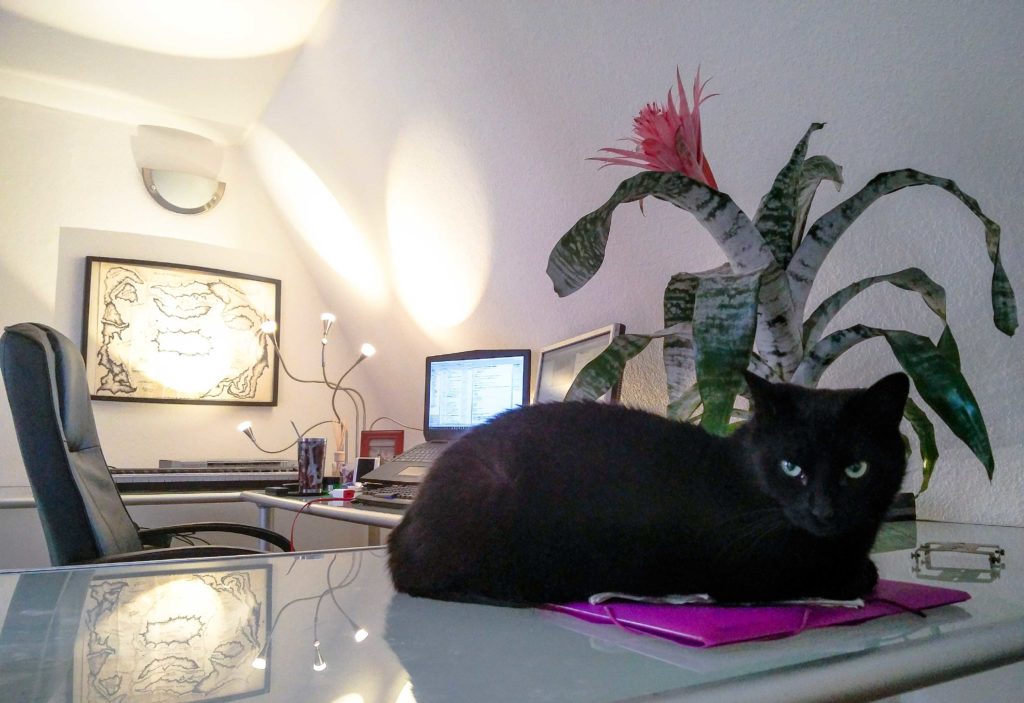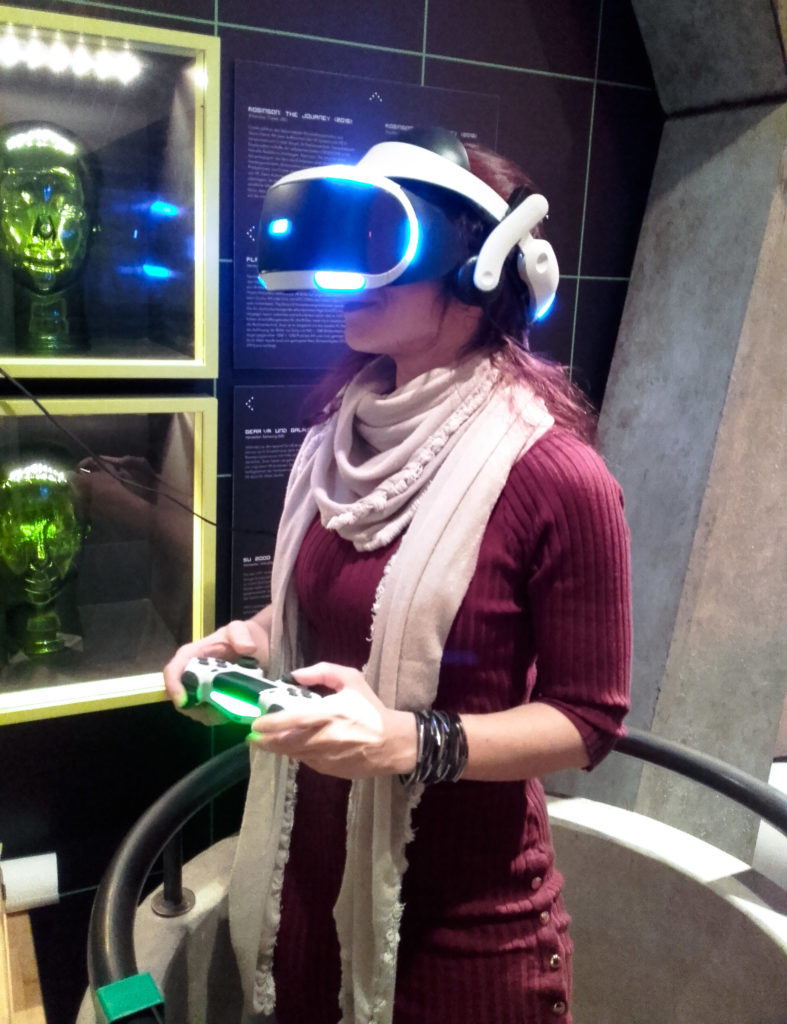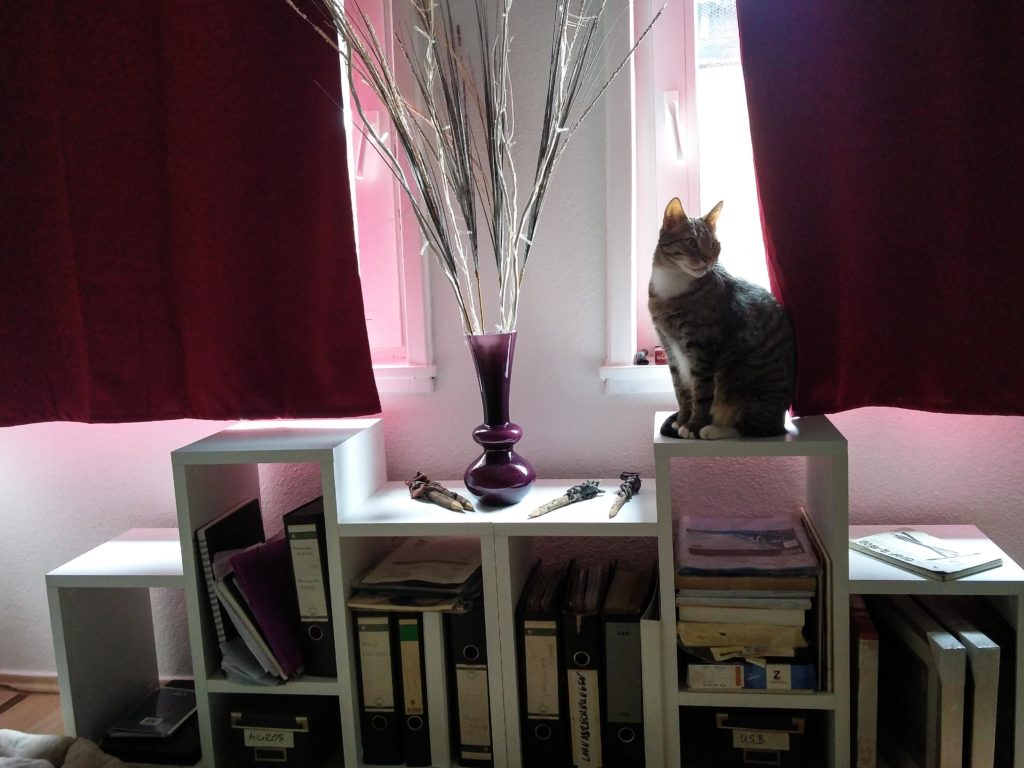Anett Enzmann ist seit 2011 als Spieleübersetzerin tätig und war so nett, uns Einlass in ihr Büro zu gewähren und uns eine Woche in ihrem Arbeitsalltag zu beschreiben. Vielen Dank für den tollen Artikel, Anett!
Within the translation community, there already exists a plethora of articles about game and app localization—best practices, how to break into the business, pricing, pitfalls—you name it. So, when the DVÜD approached me to contribute an article to their series accompanying GamesCom, I decided to take a slightly different route: while we talk, read, and write about the grand scheme of things within both the games and the translation industry, most developers and aspiring games translators don’t actually realize what the day-to-day work really entails. So, allow me to invite you into my office to look over my shoulder for a week.
Please note: since a lot of my actual projects and client names are protected by NDAs, for our purposes here I will simply make these up. Also, I will use a bit of what is obviously hyperbole to make this text as informative and entertaining as possible—not every week is quite as chaotic as the one you will be reading about!
And now, without further ado, come on in!

Monday:
This week promises to be pretty mellow. While I haven’t been hit by the crisis that hard (yet), work has definitely been slowing down—not unusual this time of the year, during the lull after the big spring releases but before the big Christmas ones. So I’ll just grab some coffee and read the news.
Oh, a Skype message! It’s from John, a long-term client, whose projects are always right up my alley: text-heavy, atmospheric dialogue, lots of research—I always learn interesting new things. He has about 40,000 words of a dialogue script for me to translate, due two weeks from now. I accept the assignment sight unseen. Usually I wouldn’t do that, but John and I have been working together for several years, and he knows what I can (and can’t) do.
A few minutes later, I get an email. It’s from Steve, a project manager at a British translation agency for which I have recently been doing a lot of Japanese RPGs. Apparently one of their clients has made some changes to a rather long title we did a few weeks back, and now needs someone familiar with the project to implement them. Steve informs me (quite apologetically) that the client sent color-coded Excel sheets. Everything in pink is new, but I also need to check the cells in aqua and turquoise. Uh, well … it’s just a couple hundred words, so of course I can take a look later today…
Meanwhile, I am making good progress on John’s text. It’s exactly what I anticipated: clear, straightforward dialogue taking place in 20th century America—my specialty. Oh, wait, what’s that? Is this one NPC talking about baseball statistics in great detail? That’s going to need some research.
The day is almost over, so it’s time to look at Steve’s Excel sheets. There are fifteen of them, containing each target language plus the original Japanese, not to mention all the string IDs and descriptions, and at least ten colors. It looks quite pretty, but which cells are the ones I am supposed to work on again? With Asian games, you will also always have to deal with manual line breaks and character limitations—and of course the inevitable placeholders, containing, for instance, the player character’s name. Working on this in Excel—which is hardly designed for word processing—requires a significant amount of time, let alone focus.

Tuesday:
I grind through the rest of Steve’s files and send them out before returning to John’s script. In order to meet the deadline at a comfortable pace, I need to get at least 2,000 words done every day.
Another email pops into my inbox—this time from Janice, the localization manager of a mobile games developer. She usually has me translate really short updates—a new game feature, a new creature type and its description—usually less than a hundred words in one of the less unwieldy online tools. So I do her fifty words and return to John’s script.
With everything that is happening in the U.S. these days, it’s kind of strange to translate this sort of narrative. While I consider it crucial to stay informed about current events unfolding in my source country and culture, I find it difficult to separate what I read in the New York Times from the content and tone of the dialogue I am translating. When this was written, no one knew how drastically things would change, and so this very much feels like a eulogy for a bygone world rather than quaint escapism.
Oh, I got mail! Look at that, it’s Joanne, another long-term US client! I did a lot of work for her company a few years ago, but these days they contact me only sporadically, to have me translate their social media marketing campaigns or customer service emails. These are due to next week, so I confirm and put it aside for now. Back to the script…

Wednesday:
About 300 words of update messages for a long-running mobile game, due later today, are awaiting me from Harry, before I get to focus on the script again. Apparently, their game has a shiny new tank, and they want to let players know right away. Another email from Joanne: could I also take on an article about their latest card design—some 4,000 words—for their website? Far be it from me to turn away a trusted client, so I accept this assignment as well, before returning to the script…
…in which the protagonist is now talking about the American Civil War. I check a few references. Luckily, I know what to look for—that one quotation almost slipped past me! Now I finally seem to be getting into some kind of flow, and even though the lines in the dialogue appear to get a bit more scrambled—thanks to the narrative branches and the choices the player can make in the conversation—I am finally making solid progress.

Thursday:
On a hunch, I open the article Joanne sent me, just to get the gist of it. And it’s a good thing I did! The HTML page saved as a Word document, riddled with formatting tags, is almost unintelligible. I need to write her about this. Also, the content is—as always—fairly technical, with lots of very specific lingo and many, many obscure references to American pop culture. I should go through it at least once before starting work on it next week.
My Skype notification goes off. It’s John, inquiring about how the script is coming along. We discuss some points about the tone for some of the NPCs and support characters. I am a bit behind on my own internal schedule, but I am certain I can catch up, provided that nothing else happens…
Now there’s another email from Steve. More changes, and this time it’s rather urgent. More Excel sheets, more color-coding. Apparently, their client has implemented further changes, this time to the item list. I quite vividly remember that list, or, as I called it, the fruit basket from hell. See, in this game you can grow all kinds of crops (real and fictitious ones) and prepare various dishes from them. Some time ago, translating the list alone took me about two days—simply because it is not humanly possible to do this sort of thing for eight hours without losing focus—during which I tried to figure out a way to render the fine distinction between chowder and cream soup in German. Luckily, these new changes are just minor, so I can put in another hour later tonight. First, the script…
…which has now moved on to the American criminal system and is quoting bluegrass songs.

Friday:
The last Friday of each month is invoicing and tax day!
John skypes me. There seems to be some sort of emergency, and he asks whether I could take on a few thousand words for an historical title I worked on before. I always love doing those, so I spend a few hours delving into ancient Greece. That’s a nice change of pace, actually…beaches, Greek ruins, lovely flora and fauna. I could really use a vacation, but that’s as close as I’ll get to one this year, so just looking at pictures of plants and fish to figure out which ones are real and which ones are fictitious—that’s pretty relaxing on a hot Friday afternoon.
Over the weekend, I will have to put in a few hours to catch up with all my deadlines, but I am happy to do that, in the knowledge that I am doing something that might ease someone’s anxiety and boredom during the pandemic by allowing them to escape into some fantasy world for a few hours. And while my work may not be classified as essential, I want to believe that what I am doing is worthwhile—that it means something to someone, somewhere.


The author: Anett has been working as a videogames translator since 2011. She is specialized in atmospheric and text-heavy science fiction/fantasy and horror games as well as American pop culture, music, and history. Her website is currently undergoing maintenance, but you can find her on Facebook, LinkedIn, Twitter and Instagram.

Unterhaltsam geschrieben und keineswegs übertrieben, solche Wochen gibt es wirklich! Vor allem mit dem montäglichen Trugschluss, dass die Woche bestimmt ruhig wird, kann ich mich gut identifizieren xD
Danke dir, Daniel! Der Trick ist, keine Verabredungen für das Ende der Woche zu planen … dann ist man auf der sicheren Seite 😉